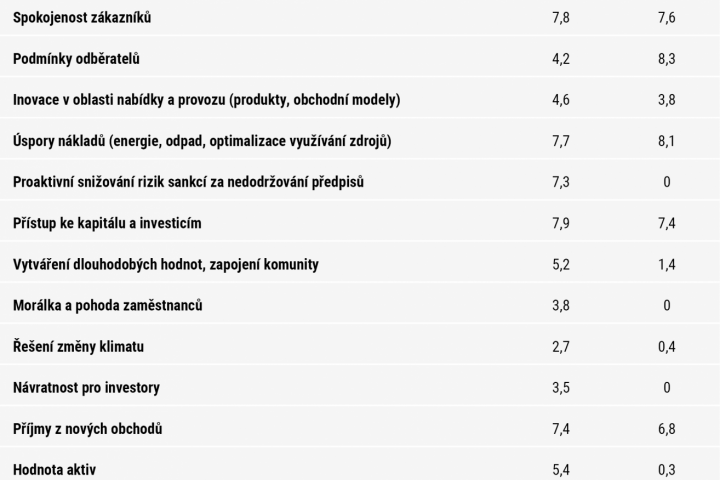
The Czech Industry Analysis 2024 is a document that can serve several purposes. Primarily, it is a source of quality data from Czech industrial companies and maps their digital maturity, e.g. in terms of motivation for digitalization, human resources, management, processes, product/production equipment life cycle or supporting processes. It also serves as feedback from company owners and directors - personal experiences with digitalization and its benefits, but also the pitfalls that companies have gone through. And thirdly, the Analysis introduces those interested in digitalisation not only to the digital audit process, but also to the basic terms, the digitalisation process and the procedure for setting up an innovation strategy.
"A series of several global crises have transformed trade and production relations. Now more than ever, companies need to react quickly to change, to adapt to new trends. In practice, it is clearly shown that this is especially possible for companies with a higher level of digitalization of their processes," says Alena Burešová, Senior Manager for Industry at NCP 4.0, defining the primary motivation for companies to introduce Industry 4.0 elements into production.
Digital strategy as a basis for effective change
The Analysis and the statements of company directors also show the importance of setting a long-term strategy for digitalization and indicate common pitfalls: If a company invests in new systems, these are usually products that are limited by the production program of the technology company and do not fully take into account the specifics of the company. The cost of implementation often exceeds the economic benefits and the improvement in the digital level is only partial - the technological potential is not fully exploited and the technological solution is economically disadvantageous for the manufacturing company. This experience leads to a consequent reluctance of SMEs to invest in digital innovation.
Michal Matějka from PRK Partners lawyer office confirms this: "When digitizing, it is often a mistake that a company tries to digitize existing processes without thinking about their possible simplification and streamlining. This often leads to overly complex digitalization projects with high costs and unconvincing results. On the other hand, properly executed digitalization almost always leads to simplification of company processes, both within the company and in relation to customers."
Avoiding unnecessary investments or calculating the return on investment in technology is the primary task. "In practice, companies make the mistake of overlooking the real, long-term benefits of digitalisation and usually have the misconception that their production works very efficiently. Thus, they do not see the savings opportunities and refuse to talk about digitalisation right from the start. As a rule, the financial benefits and return on investment can be calculated quite accurately, but some companies make decisions based on the amount of the initial investment and do not take the return and long-term benefits into account," says Radek Rutkovský from SICK company.
The author of the DigiAudit methodology, Lubomír Kristek from NCP 4.0, sums it all up: "No one is debating the need to digitize data and processes and thus take the first step towards a company where the necessary information is always available at the snap of a finger and where there is one source and one version of the truth. Figuring out how to make digitization achievable, systematic, in the right order, with the right people, and leading to the desired results is the biggest nut to crack. That's why we developed DigiAudit."

ESG Reporting and digitalisation go hand in hand
Sustainability is not yet a motivation for Czech companies to raise their digital level in this area, even for many companies for which ESG reporting (environmental, social, and governmental responsibility reports) will soon become a legal obligation. Yet digitalisation plays a key role not only in strengthening sustainability, but especially in clearly and transparently communicating their commitments to their business partners, financial institutions and investors. And this also applies to SMEs, which are not yet directly affected by ESG reporting. Practice very often requires the opposite. In fact, more and more companies are not only meeting sustainability criteria in their own production, but are also demanding the same from their suppliers. Banks are becoming more and more attentive to how green a company is when approving investment loans. They are also evaluated by their shareholders in terms of their compliance with ESG criteria.
"A higher level of digitalization in these areas is vital for the competitiveness of Czech industry. For example, if a company has data from all machines in real time, it significantly increases the efficiency of its production process. A company can monitor the operational status of all its machines and equipment, allowing immediate identification of potential problems and faults. In this way, it can prevent production downtime and reduce the time that machines are out of service. With a better understanding of the operational behaviour of machines, their performance and energy consumption can also be optimised, resulting in further savings for the company. Investments that meet sustainability requirements may have easier access or a more advantageous financing structure in the future or, for example, cheaper funding," Jakub Jeřábek, sustainability expert at Česká spořitelna, links the benefits of sustainability, digitalisation and competitiveness.
"Proper implementation of digital tools in itself increases the competitiveness of the company, makes processes more efficient, and with properly set reporting helps management in decision-making, regardless of the legislative framework given by the EU CSRD. Mandatory ESG reporting requires auditability and traceability of the data on which the report is based. Thus, mandatory reporting can be one of the drivers for digitalization, especially in the area of data collection and evaluation, not only in a specific company, but across the entire supply chain," says Jiří Pavlík of Deloitte.
For large companies, in addition to cost savings, a major motivator is the prospect of new business opportunities (7.4 points). Compared to SMEs, foreign corporations in particular have embedded sustainability compliance in their long-term global strategies, and their other priorities depend on this, as shown in the table above.
Whether a company's motivation for sustainability is pressure from its customers or banks, or whether its goal is to optimise costs and reduce energy consumption, in all cases it is digitalisation that can significantly help company directors to better meet their commitments.
Digitalisation has a key role to play in improving the quality of ESG reporting. It helps companies get accurate and up-to-date information on their ESG performance, leading to significantly increased transparency and credibility. Data is the foundation of every report. Digital technologies enable companies to collect large amounts of data in an automated manner from various internal and external sources such as sensors in factories, financial systems, external ESG reports, etc. This data is then validated and evaluated in context. Last but not least, digital reporting is of course cheaper.
"For manufacturing companies in particular, it is crucial to integrate sustainability into their digitalization strategy through automation and efficient data collection, analysis and reporting, and optimization of production and logistics processes based on a digital model of production and products. These steps make it possible to ensure transparency and coordination between process links, optimising them and ultimately reducing the product's carbon footprint. Sustainability thus represents an opportunity for companies to increase their competitiveness and resilience in the long term," summarises Robert Keil, Director of NCP 4.0, on the need for a digitisation strategy and subsequent reporting.